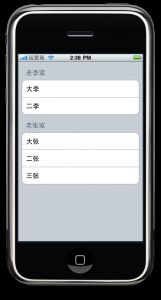- 高德地图_公共交通路径规划API,获取两地点之间的驾车里程和时间
Sheyueyu
爬虫交通python路径规划爬虫
importpandasaspdimportrequestsimportjsondefget_dis_tm(origin,destination,city,cityd):url='https://restapi.amap.com/v3/direction/transit/integrated?'key='xxx'#这里就是需要去高德开放平台去申请key,请在xxxx位置填写,web服务APIlin
- 潇洒郎: Python获取设备已连接的所有WIFi账号和密码
潇洒郎
Python学习pythonWiFi账号和密码
Python获取设备已连接的所有WIFi账号和密码如果你忘记了密码,可以使用这个脚本获取,不要使用非法用途哦!#coding=utf8#User:Administrator#Date:2024/11/5#Time:13:02importsubprocessimportjsondefsub_cmd(cmd):res=subprocess.getoutput(cmd)returnresdefget_a
- 【Bug合集】——Java大小写引起传参失败,获取值为null的解决方案
三三是该溜子
java开发语言Springboot
阿华代码,不是逆风,就是我疯你们的点赞收藏是我前进最大的动力!!希望本文内容能够帮助到你!!目录一:本文面向的人群二:错误场景引入三:正确场景引入四:问题解决五:解决方法1:public修饰2:使用@JsonProperty注解一:本文面向的人群本文主要针对类中成员变量命名问题引起传送json字符串,但是变量为null的情况做出解释。其中涉及到@Data注解(Spring自动生成的get和set方
- logback+kafka+ELK实现日志记录(操作)
酷酷的码农小哥
javakafkaspringbootspring
logback+kafka+ELK实现日志记录前言环境准备配置Logbackpom文件改造新增logback-spring.xmlboot配置文件一下怎么去下载安装我就不多说了,直接上代码。日志平台业务思路用户请求进入后台根据搜索的参数去查询内容返回所有信息,返回json数据,当用户查看详情后根据查询到的内容里面的traceId去es里查询和traceId相等的所有日志信息最后返回给前端业务流程[
- docker pull 镜像失败 Error response from daemon: Get “https://registry-1.docker.io/v2/“: net/http: reque
jjw_zyfx
docker/k8sJavadockerhttp容器
解决方法:多加几个docker的镜像源,步骤如下:使用vim打开/etc/docker/daemon.json这个文件vim/etc/docker/daemon.json填写内容如下:{"registry-mirrors":["https://docker.211678.top","https://docker.1panel.live","https://hub.rat.dev","https:/
- Objective-C语言的安全开发
萧澄华
包罗万象golang开发语言后端
Objective-C语言的安全开发引言在当今的信息技术时代,软件的安全性已成为开发者必须重视的重点。随着移动互联网的蓬勃发展,iOS作为重要的移动操作系统,受到越来越多开发者的关注。而Objective-C作为iOS应用开发的主要语言之一,其安全性问题也应引起重视。本文将探讨在Objective-C语言中进行安全开发的最佳实践,帮助开发者在应用编程过程中减少安全隐患,提高应用的安全性。一、了解O
- DELL笔记本UEFI+GPT安装Win10与CentOS双系统
wespten
LinuxSRE运维部署与监控系统性能指标故障排除centoslinux运维
在正式安装前,要知道的几个信息。电脑是uefi启动还是传统的LegacyBIOS启动开机按F2,进入bios,在boot项中,bootmode为UEFI,则为uefi启动方式。也可以通过按下win+r打开运行,输入cmd打开命令提示符,输入bcdedit/enum{current}按回车执行;如果path路径是winload.efi,则说明系统是通过UEFI模式启动。如果时winload.exe,
- 认识包管理工具: npm、yarn和pnpm
前端npm工程化
包管理工具的发展2010年1月,一款名为npm的包管理器诞生。它确立了包管理器工作的核心原则。npm的发布诞生了一场革命,在此之前,项目依赖项都是手动下载和管理的。npm引入了文件和元数据字段,将依赖项列表存储在package.json文件中,并且将下载的文件保存到node_modules文件夹中。后来因为npm的缺陷或者旧版本的不足,又出现了一个个替代npm来进行包管理的轮子,例如:yarn,y
- Linux-Ubuntu入门笔记
LeoJamLin
linuxlinux
一.linux操作系统概述1.常见操作系统-服务端操作系统:linux、unix、windowsserver-单机操作系统:windows(dos、ucdos、win95、win98、win2000、xp、vista、win7、win8)MAC、linux(ubuntu)-移动操作系统Android、IOS、Windowsphone2.linux操作系统介绍-为什么要学习linux操作系统1.大部
- 【odoo】odoo 公共方法的设计与实现
种花的人_
odoopython
Odoo公共方法的设计与实现1.功能需求2.seController类分析2.1res_ok方法:返回成功响应2.2res_err方法:返回错误响应2.3res_exception方法:捕获并返回异常2.4json_default方法:自定义JSON序列化2.5错误码字典error_code3.总结在Odoo开发中,我们常常需要编写一些通用的功能方法,这些方法可以帮助我们更高效地处理数据格式化、错
- Python笔记1.2(open、logging、os、shutil、glob、decode、encode、pickle、tqdm)
qq742234984
python笔记数据库
Python笔记1.1(datetime、argparse、sys、overwrite、eval、json、os、zfill、endswith、traceback、深浅拷贝)Python笔记2(函数参数、面向对象、装饰器、高级函数、捕获异常、dir)Python笔记1.214、withopen()asfile和open()参数详解15、logging日志的等级logging.basicConfig
- ES6 (三)字符串的扩展、模板字符串、模板编译、标签模板
ChrisP3616
前端工程师1——汇总前端工程师3——ES6字符串es6unicodejson
ES6(三)字符串的扩展、模板字符串、模板编译、标签模板文章目录ES6(三)字符串的扩展、模板字符串、模板编译、标签模板1.字符的Unicode表示法2.字符串的遍历器接口3.直接输入U+2028和U+20294.JSON.stringify()的改造5.模板字符串6.实例:模板编译(==Review==)7.==标签模板==8.模板字符串的限制1.字符的Unicode表示法ES6加强了对Unic
- 【AI日志分析】基于机器学习的异常检测:告别传统规则的智能进阶
网罗开发
AI大模型人工智能机器学习
网罗开发(小红书、快手、视频号同名) 大家好,我是展菲,目前在上市企业从事人工智能项目研发管理工作,平时热衷于分享各种编程领域的软硬技能知识以及前沿技术,包括iOS、前端、HarmonyOS、Java、Python等方向。在移动端开发、鸿蒙开发、物联网、嵌入式、云原生、开源等领域有深厚造诣。图书作者:《ESP32-C3物联网工程开发实战》图书作者:《SwiftUI入门,进阶与实战》超级个体:CO
- uniapp 小程序目录搭建以及 pages.json 配置
YZRHANYU
uniapp+微信小程序jsonuni-app小程序
uniapp小程序目录搭建1.分包结构├──api各个模块接口文件夹├──login.js登录模块接口文件├──common公共模块,包含公共基础css等├──base.css公共基础css├──components主包当中使用的组件或者复用率较高的组件作为全局组件├──node_modulesnodejs相关依赖包文件目录├──pages主包:业务页面文件存放的目录├──common├──sys
- @RequestBody接收Json参数 | 用自定义注解对Vo对象中Date类型日期格式校验
手hold刺猬
003.疑难问题javaspringmvcjson正则表达式springboot
标题太长有木有?主要是为了把问题描述清楚,免得进错文章。问题描述昨天测试的同事测试接口的时候,测试出来一个Date类型校验问题。要求输入的日期格式是:yyyy-MM-ddHH:mm:ss,Vo中使用的注解如下:@DateTimeFormat(pattern=”yyyy-MM-ddHH:mm:ss”)测试同事输入下面两种参数都是保存成功,当输入为“202105”参数时,保存的数据变为“1970-01
- GO语言使用Nacos(nacos-sdk-go的使用)
dream21st
goland学习笔记golang微服务java
文章目录1注册中心使用1.1配置说明1.2注册服务1.3拉取服务1.4获取服务方法说明获取服务信息:获取所有实例列表:获取健康实例列表:获取一个健康实例:监听服务变化:取消服务监听:分页获取服务名列表:2配置中心使用发布数据:发布一个JSON数据:删除配置文件:获取配置文件里面的数据:监听配置文件的变化:取消监听配置文件的变化:搜索配置文件:Nacos/nɑ:kəʊs/是DynamicNaming
- PLC实现HTTP协议JSON格式数据上报对接的参数配置说明
AIHE-TECH
httpjson网络协议西门子PLCMES网页url
IGT-SER系列PLC通讯智能网关支持HTTP协议GET和POST、PUT请求模式。支持JSON格式的文件,也可以实现WebService的调用。通常智能网关是HTTP协议的客户端,也可以同时作为HTTP的服务端。相关案例作为客户端时支持触发、周期、混合等多种工作模式与服务端通讯:周期模式根据所设置的周期时间提交请求和解析返回的文件;触发模式可配置一个或多个触发条件,网关根据触发条件的数据变化进
- Minio容器启动配置https
非ban必选
docker大数据
不建议这样使用,建议使用nginx做反向代理,建议使用内网url作为上传文件api的endpoint1、公钥和私钥配置根据官网描述(HowtosecureaccesstoMinIOserverwithTLS),将TLS的公私钥放到:{{HOME}}/.minio/certs里私钥需要命名为:private.key公钥需要命名为:public.crt(如果公钥是以pem格式结尾,可直接改为crt格式
- Linux系统下minio设置SSL证书进行HTTPS远程连接访问
薄荷街的兔比先生
linuxsslhttps
文章目录1.配置SSL证书使用HTTPS访问2.MINIOSDK忽略证书验证3.使用受信任的证书1.配置SSL证书使用HTTPS访问生成域名对应的SSL证书,下载Apache版本,我目前只发现Apache这个里面有对应的私钥和证书私钥重命名为private.key证书重命名为public.crt,不更改为指定格式则会无法被识别。将公钥和证书放入root/.minio/certs文件夹中,此文件夹安
- 使用嗅探大师(sniffmaster)破解https加密
鹅肝手握高V五色
https网络协议tcpdump爬虫抓包嗅探大师sniffmaster
嗅探大师进行HTTPS暴力抓包不需要越狱、设置代理或安装信任证书,能够自动解密HTTPS数据,即使应用设置了PIN和双向验证也能够正常抓包。但是,要求被抓取的App必须使用iOS开发证书签名。对于未重签名的应用(如iOS系统应用或部分第三方应用),只能查看请求地址和请求头,无法查看请求体(body)。准备iOS设备连接设备:通过USB将iOS设备连接到电脑,设备需解锁并处于亮屏状态。信任电脑:如果
- 手机崩溃日志的查找与分析
鹅肝手握高V五色
ios网络
摘要本文介绍了一款名为克魔助手的iOS应用日志查看工具,该工具可以方便地查看iPhone设备上应用和系统运行时的实时日志和崩溃日志。同时还提供了崩溃日志的分析查看模块,可以对苹果崩溃日志进行符号化、格式化和分析,极大地简化了开发者的调试工作。引言在iOS应用开发过程中,调试日志和崩溃日志是开发者必不可少的工具。然而,使用XcodeConsole等工具查看日志可能不够方便,而且处理崩溃日志也相当繁琐
- iOS App 上架App Store及提交审核详细教程
鹅肝手握高V五色
cocoamacosobjective-c
上架AppStore审核分7步进行:目录一、上传ipa到AppStore二、设置APP各项信息提交审核1、安装iOS上架辅助软件Appuploader2、申请iOS发布证书(p12)3、申请iOS发布描述文件(mobileprovision)4、打包ipa5、上传ipa到iTunesConnect6、TestFlight方式安装到苹果手机测试7、设置APP各项信息提交审核前四布我们之前都做了,详见
- 豆瓣API-我在IDE上标记想看的电影(低配版API文档)
dreadp
前端pythonbeautifulsoupseleniumhtmlweb数据分析
引言我只是想在IDE上标记想看的电影,所以写了这个脚本…以下是脚本调用的API接口使用指南.脚本运行方式以及使用方法在使用MovieWishlister.py脚本之前,保证运行过一次TagAssassin.py中的get_all_tags(douban_user_url)函数来更新写入的文件中的标签,保证此时是最新的,以便可看JSON文件的标签来核对自己曾自定义的标签名.因为标签过多可能无法一次性
- elementui树状菜单tree_Java + Element-UI 实现简单的树形菜单
weixin_39682301
一、简单入门级树形菜单实现(纯后台逻辑)1、简介(1)开发环境IDEA+JDK1.8+mysql1.8SpringBoot2.2.6+mybatis-plus此处仅后台开发(返回json数据),前台页面展示后续会讲解。(2)数据表如下,仅供参考,可以添加修改时间、创建时间、逻辑删除等字段。DROPDATABASEIFEXISTStest;CREATEDATABASEtest;USEtest;/*用
- deepin-UEFI 引导:从入门到重装
deepin
在现代计算机中,UEFI(统一可扩展固件接口)已成为主流的启动方式,逐渐取代了传统的BIOS。UEFI提供了许多改进,如更灵活的启动管理、更大的分区支持以及更快的启动速度。然而,对于许多Linux用户来说,UEFI的复杂性可能会带来一些挑战,尤其是在多系统环境中。本文将详细介绍如何在Linux下使用UEFI引导系统,以及如何在出现问题时进行修复和重装。1.UEFI的基本原理UEFI是一种替代传统B
- BeautifulSoup-爬虫案例(一)
羡羡~~羡羡~~~
Pythonpythonexcel
一个爬虫案例frombs4importBeautifulSoupimportrequestsimportreimportosimportxlrdimportxlwtfromxlutils.copyimportcopyimportrandomimportjsonimportdatetimeimporttimeIS_FIRST=TrueROOT_PATH=os.path.abspath('..')#设
- 淘宝/天猫获取sku详细信息 API 返回值说明
API-小海豚
数据库服务器运维网络爬虫
淘宝和天猫平台允许开发者通过API接口获取商品的详细信息,包括价格、商品属性和SKU(StockKeepingUnit,库存量单位)等。以下是关于获取SKU详细信息API的返回值说明及代码示例:一、API返回值说明当调用获取SKU详细信息的API时,服务器会返回一个包含商品SKU详情的响应。以下是一个简化的返回值示例:json复制代码{"item":{"num_iid":"商品ID",//商品ID
- 后端开发基础——JavaWeb(根基,了解原理)浓缩
Wanna715
后端开发基础javatomcatservlet后端
总述学习Tomcat、JSON、Servlet、Filter、Session、Cookie、Ajax异步请求、RESTful接口规范、JSP(很老的技术,了解)Servlet系统架构C/S架构(Client/Server(客户端/服务器))B/S架构(Browser/Server,浏览器/服务器)javaJavaSE:Java标准版JavaEE:企业版(WEB方向,WEB系统)13种规范,其中Se
- 【Web前端】JWT(JSON Web Tokens)概述
泡芙冰淇淋ya
Web前端json
1、简介JWT(JSONWebTokens)是一种用于双方之间安全传输信息的简洁的、URL安全的令牌标准。它基于JSON对象,并通过数字签名确保其完整性和真实性。JWT因其小巧、自包含以及易于在客户端和服务器之间传输的特性而被广泛使用于身份验证和信息交换的场景中。2、组成部分JWT由三个部分组成,这三部分通过点(.)分隔:Header(头部):头部通常包含了两部分信息:例如:typ:表示令牌的类型
- 登录授权方案:JSON Web Tokens (JWT)
Java牛马
javaJWT登录授权授权校验
登录授权方案:JSONWebTokens(JWT)JWT官方文档:https://jwt.io/introduction1.简介:JWT即jsonwebtokens,通过JSON形式作为Web应用中的令牌,用于在各方之间安全地将信息作为JSON对象传输,在数据传输过程中还可以完成数据加密、签名等相关处理。可用于登录授权或者其他服务之前的信息交换;JWT本质就是一个字符串,它是一个开放标准(rfc7
- [星球大战]阿纳金的背叛
comsci
本来杰迪圣殿的长老是不同意让阿纳金接受训练的.........
但是由于政治原因,长老会妥协了...这给邪恶的力量带来了机会
所以......现代的地球联邦接受了这个教训...绝对不让某些年轻人进入学院
- 看懂它,你就可以任性的玩耍了!
aijuans
JavaScript
javascript作为前端开发的标配技能,如果不掌握好它的三大特点:1.原型 2.作用域 3. 闭包 ,又怎么可以说你学好了这门语言呢?如果标配的技能都没有撑握好,怎么可以任性的玩耍呢?怎么验证自己学好了以上三个基本点呢,我找到一段不错的代码,稍加改动,如果能够读懂它,那么你就可以任性了。
function jClass(b
- Java常用工具包 Jodd
Kai_Ge
javajodd
Jodd 是一个开源的 Java 工具集, 包含一些实用的工具类和小型框架。简单,却很强大! 写道 Jodd = Tools + IoC + MVC + DB + AOP + TX + JSON + HTML < 1.5 Mb
Jodd 被分成众多模块,按需选择,其中
工具类模块有:
jodd-core &nb
- SpringMvc下载
120153216
springMVC
@RequestMapping(value = WebUrlConstant.DOWNLOAD)
public void download(HttpServletRequest request,HttpServletResponse response,String fileName) {
OutputStream os = null;
InputStream is = null;
- Python 标准异常总结
2002wmj
python
Python标准异常总结
AssertionError 断言语句(assert)失败 AttributeError 尝试访问未知的对象属性 EOFError 用户输入文件末尾标志EOF(Ctrl+d) FloatingPointError 浮点计算错误 GeneratorExit generator.close()方法被调用的时候 ImportError 导入模块失
- SQL函数返回临时表结构的数据用于查询
357029540
SQL Server
这两天在做一个查询的SQL,这个SQL的一个条件是通过游标实现另外两张表查询出一个多条数据,这些数据都是INT类型,然后用IN条件进行查询,并且查询这两张表需要通过外部传入参数才能查询出所需数据,于是想到了用SQL函数返回值,并且也这样做了,由于是返回多条数据,所以把查询出来的INT类型值都拼接为了字符串,这时就遇到问题了,在查询SQL中因为条件是INT值,SQL函数的CAST和CONVERST都
- java 时间格式化 | 比较大小| 时区 个人笔记
7454103
javaeclipsetomcatcMyEclipse
个人总结! 不当之处多多包含!
引用 1.0 如何设置 tomcat 的时区:
位置:(catalina.bat---JAVA_OPTS 下面加上)
set JAVA_OPT
- 时间获取Clander的用法
adminjun
Clander时间
/**
* 得到几天前的时间
* @param d
* @param day
* @return
*/
public static Date getDateBefore(Date d,int day){
Calend
- JVM初探与设置
aijuans
java
JVM是Java Virtual Machine(Java虚拟机)的缩写,JVM是一种用于计算设备的规范,它是一个虚构出来的计算机,是通过在实际的计算机上仿真模拟各种计算机功能来实现的。Java虚拟机包括一套字节码指令集、一组寄存器、一个栈、一个垃圾回收堆和一个存储方法域。 JVM屏蔽了与具体操作系统平台相关的信息,使Java程序只需生成在Java虚拟机上运行的目标代码(字节码),就可以在多种平台
- SQL中ON和WHERE的区别
avords
SQL中ON和WHERE的区别
数据库在通过连接两张或多张表来返回记录时,都会生成一张中间的临时表,然后再将这张临时表返回给用户。 www.2cto.com 在使用left jion时,on和where条件的区别如下: 1、 on条件是在生成临时表时使用的条件,它不管on中的条件是否为真,都会返回左边表中的记录。
- 说说自信
houxinyou
工作生活
自信的来源分为两种,一种是源于实力,一种源于头脑.实力是一个综合的评定,有自身的能力,能利用的资源等.比如我想去月亮上,要身体素质过硬,还要有飞船等等一系列的东西.这些都属于实力的一部分.而头脑不同,只要你头脑够简单就可以了!同样要上月亮上,你想,我一跳,1米,我多跳几下,跳个几年,应该就到了!什么?你说我会往下掉?你笨呀你!找个东西踩一下不就行了吗?
无论工作还
- WEBLOGIC事务超时设置
bijian1013
weblogicjta事务超时
系统中统计数据,由于调用统计过程,执行时间超过了weblogic设置的时间,提示如下错误:
统计数据出错!
原因:The transaction is no longer active - status: 'Rolling Back. [Reason=weblogic.transaction.internal
- 两年已过去,再看该如何快速融入新团队
bingyingao
java互联网融入架构新团队
偶得的空闲,翻到了两年前的帖子
该如何快速融入一个新团队,有所感触,就记下来,为下一个两年后的今天做参考。
时隔两年半之后的今天,再来看当初的这个博客,别有一番滋味。而我已经于今年三月份离开了当初所在的团队,加入另外的一个项目组,2011年的这篇博客之后的时光,我很好的融入了那个团队,而直到现在和同事们关系都特别好。大家在短短一年半的时间离一起经历了一
- 【Spark七十七】Spark分析Nginx和Apache的access.log
bit1129
apache
Spark分析Nginx和Apache的access.log,第一个问题是要对Nginx和Apache的access.log文件进行按行解析,按行解析就的方法是正则表达式:
Nginx的access.log解析正则表达式
val PATTERN = """([^ ]*) ([^ ]*) ([^ ]*) (\\[.*\\]) (\&q
- Erlang patch
bookjovi
erlang
Totally five patchs committed to erlang otp, just small patchs.
IMO, erlang really is a interesting programming language, I really like its concurrency feature.
but the functional programming style
- log4j日志路径中加入日期
bro_feng
javalog4j
要用log4j使用记录日志,日志路径有每日的日期,文件大小5M新增文件。
实现方式
log4j:
<appender name="serviceLog"
class="org.apache.log4j.RollingFileAppender">
<param name="Encoding" v
- 读《研磨设计模式》-代码笔记-桥接模式
bylijinnan
java设计模式
声明: 本文只为方便我个人查阅和理解,详细的分析以及源代码请移步 原作者的博客http://chjavach.iteye.com/
/**
* 个人觉得关于桥接模式的例子,蜡笔和毛笔这个例子是最贴切的:http://www.cnblogs.com/zhenyulu/articles/67016.html
* 笔和颜色是可分离的,蜡笔把两者耦合在一起了:一支蜡笔只有一种
- windows7下SVN和Eclipse插件安装
chenyu19891124
eclipse插件
今天花了一天时间弄SVN和Eclipse插件的安装,今天弄好了。svn插件和Eclipse整合有两种方式,一种是直接下载插件包,二种是通过Eclipse在线更新。由于之前Eclipse版本和svn插件版本有差别,始终是没装上。最后在网上找到了适合的版本。所用的环境系统:windows7JDK:1.7svn插件包版本:1.8.16Eclipse:3.7.2工具下载地址:Eclipse下在地址:htt
- [转帖]工作流引擎设计思路
comsci
设计模式工作应用服务器workflow企业应用
作为国内的同行,我非常希望在流程设计方面和大家交流,刚发现篇好文(那么好的文章,现在才发现,可惜),关于流程设计的一些原理,个人觉得本文站得高,看得远,比俺的文章有深度,转载如下
=================================================================================
自开博以来不断有朋友来探讨工作流引擎该如何
- Linux 查看内存,CPU及硬盘大小的方法
daizj
linuxcpu内存硬盘大小
一、查看CPU信息的命令
[root@R4 ~]# cat /proc/cpuinfo |grep "model name" && cat /proc/cpuinfo |grep "physical id"
model name : Intel(R) Xeon(R) CPU X5450 @ 3.00GHz
model name :
- linux 踢出在线用户
dongwei_6688
linux
两个步骤:
1.用w命令找到要踢出的用户,比如下面:
[root@localhost ~]# w
18:16:55 up 39 days, 8:27, 3 users, load average: 0.03, 0.03, 0.00
USER TTY FROM LOGIN@ IDLE JCPU PCPU WHAT
- 放手吧,就像不曾拥有过一样
dcj3sjt126com
内容提要:
静悠悠编著的《放手吧就像不曾拥有过一样》集结“全球华语世界最舒缓心灵”的精华故事,触碰生命最深层次的感动,献给全世界亿万读者。《放手吧就像不曾拥有过一样》的作者衷心地祝愿每一位读者都给自己一个重新出发的理由,将那些令你痛苦的、扛起的、背负的,一并都放下吧!把憔悴的面容换做一种清淡的微笑,把沉重的步伐调节成春天五线谱上的音符,让自己踏着轻快的节奏,在人生的海面上悠然漂荡,享受宁静与
- php二进制安全的含义
dcj3sjt126com
PHP
PHP里,有string的概念。
string里,每个字符的大小为byte(与PHP相比,Java的每个字符为Character,是UTF8字符,C语言的每个字符可以在编译时选择)。
byte里,有ASCII代码的字符,例如ABC,123,abc,也有一些特殊字符,例如回车,退格之类的。
特殊字符很多是不能显示的。或者说,他们的显示方式没有标准,例如编码65到哪儿都是字母A,编码97到哪儿都是字符
- Linux下禁用T440s,X240的一体化触摸板(touchpad)
gashero
linuxThinkPad触摸板
自打1月买了Thinkpad T440s就一直很火大,其中最让人恼火的莫过于触摸板。
Thinkpad的经典就包括用了小红点(TrackPoint)。但是小红点只能定位,还是需要鼠标的左右键的。但是自打T440s等开始启用了一体化触摸板,不再有实体的按键了。问题是要是好用也行。
实际使用中,触摸板一堆问题,比如定位有抖动,以及按键时会有飘逸。这就导致了单击经常就
- graph_dfs
hcx2013
Graph
package edu.xidian.graph;
class MyStack {
private final int SIZE = 20;
private int[] st;
private int top;
public MyStack() {
st = new int[SIZE];
top = -1;
}
public void push(i
- Spring4.1新特性——Spring核心部分及其他
jinnianshilongnian
spring 4.1
目录
Spring4.1新特性——综述
Spring4.1新特性——Spring核心部分及其他
Spring4.1新特性——Spring缓存框架增强
Spring4.1新特性——异步调用和事件机制的异常处理
Spring4.1新特性——数据库集成测试脚本初始化
Spring4.1新特性——Spring MVC增强
Spring4.1新特性——页面自动化测试框架Spring MVC T
- 配置HiveServer2的安全策略之自定义用户名密码验证
liyonghui160com
具体从网上看
http://doc.mapr.com/display/MapR/Using+HiveServer2#UsingHiveServer2-ConfiguringCustomAuthentication
LDAP Authentication using OpenLDAP
Setting
- 一位30多的程序员生涯经验总结
pda158
编程工作生活咨询
1.客户在接触到产品之后,才会真正明白自己的需求。
这是我在我的第一份工作上面学来的。只有当我们给客户展示产品的时候,他们才会意识到哪些是必须的。给出一个功能性原型设计远远比一张长长的文字表格要好。 2.只要有充足的时间,所有安全防御系统都将失败。
安全防御现如今是全世界都在关注的大课题、大挑战。我们必须时时刻刻积极完善它,因为黑客只要有一次成功,就可以彻底打败你。 3.
- 分布式web服务架构的演变
自由的奴隶
linuxWeb应用服务器互联网
最开始,由于某些想法,于是在互联网上搭建了一个网站,这个时候甚至有可能主机都是租借的,但由于这篇文章我们只关注架构的演变历程,因此就假设这个时候已经是托管了一台主机,并且有一定的带宽了,这个时候由于网站具备了一定的特色,吸引了部分人访问,逐渐你发现系统的压力越来越高,响应速度越来越慢,而这个时候比较明显的是数据库和应用互相影响,应用出问题了,数据库也很容易出现问题,而数据库出问题的时候,应用也容易
- 初探Druid连接池之二——慢SQL日志记录
xingsan_zhang
日志连接池druid慢SQL
由于工作原因,这里先不说连接数据库部分的配置,后面会补上,直接进入慢SQL日志记录。
1.applicationContext.xml中增加如下配置:
<bean abstract="true" id="mysql_database" class="com.alibaba.druid.pool.DruidDataSourc

